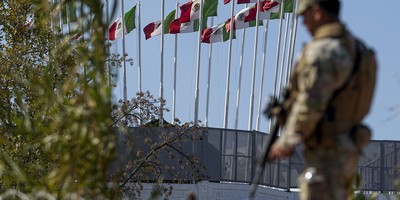A year ago the Democrats were ecstatic over the prospect of tying the Republican presidential candidate to George Bush and his supposedly failed war in Iraq. Today the subject of the war has returned to the forefront of the campaign, but it is John McCain who is making an issue of it. Over the past week the McCain campaign has called as much attention as possible to Barack Obama’s recent attempt to reconcile the things he has said about Iraq over the past few years to today’s reality on the ground. Obama has even changed the Iraq page on his website to remove previous criticism of the successful troop surge and to delete the reference to removing troops from Iraq beginning “immediately.”
One doesn’t need a long memory to recall Obama’s multiple positions on the war in Iraq. Before we went into Iraq, Obama favored rolling the dice and trusting Saddam Hussein’s word on the threat he posed to the United States. Obama won the Democratic nomination in large part by criticizing Hillary Clinton for her initial support of the invasion of Iraq. I wonder how many Democrats would have predicted that Hillary Clinton’s Iraq position would be the one vindicated by events in the final months of the election. Her predictions were certainly more accurate than any of Barack Obama’s.
In January of 2007, Obama did not believe the troop surge in Iraq would work. On MSNBC he said, “I am not persuaded that 20,000 additional troops in Iraq is going to solve the sectarian violence there. In fact, I think it will do the reverse.” On Face the Nation, he said, “We cannot impose a military solution on what has effectively become a civil war. And until we acknowledge that reality -- we can send 15,000 more troops, 20,000 more troops, 30,000 more troops, I don't know any expert on the region or any military officer that I've spoken to privately that believes that that is going to make a substantial difference on the situation on the ground.” Less than a year ago, Obama was ready to declare defeat and pull the troops out of Iraq.
To know what he might be willing to do a year from now (or even a month from now), it would be necessary to know what the public opinion polls will say then. Bill Clinton led by opinion poll and the public seemed to be just fine with that, but at the same time Bill Clinton was admiring his 60 plus percent approval ratings (taking out just enough time from his legal defense to preach the virtues of school uniforms) the 9/11 terrorists were conceiving the most deadly attack on U.S. soil in the history of the nation. Public opinion polls obviously do not a successful foreign policy make. In fact, they don’t even make for a successful presidency. Just ask President George Herbert Walker Bush who enjoyed sky high approval ratings following the Gulf War, but went on to lose re-election. As quickly as public approval can be bestowed upon a candidate, it can be withdrawn.
Recommended
Even if it were smart political calculation, when a candidate decides their position on foreign policy according to public opinion they take a huge political risk. Public opinion can change on a dime, but candidates changing their positions on such important issues find themselves with some explaining to do.
This week even the Washington Post recognized Obama’s confusing position on the issue of Iraq policy: “…At the time he first proposed his timetable, Mr. Obama argued -- wrongly, as it turned out -- that U.S. troops could not stop a sectarian civil war. He conceded that a withdrawal might be accompanied by a "spike" in violence. Now, he describes as “an achievable goal" that ‘we leave Iraq to a government that is taking responsibility for its future -- a government that prevents sectarian conflict and ensures that the al-Qaeda threat which has been beaten back by our troops does not reemerge.’ How will that "true success" be achieved? By the same pullout that Mr. Obama proposed when chaos in Iraq appeared to him inevitable.”
The situation in Iraq today is far from what Barack Obama predicted. Today it appears a successful outcome there is possible. Following a recent trip to Iraq, Frederick Kagan, Kimberly Kagan and Jack Keane wrote: “All of the most important objectives of the surge have been accomplished in Iraq. The sectarian civil war is ended; al Qaeda in Iraq (AQI) has been dealt a devastating blow; and the Sadrist militia and other Iranian-backed militant groups have been disrupted. Meanwhile, the Iraqi government has accomplished almost all of the legislative benchmarks set by the U.S. Congress and the Bush administration. More important, it is gaining wider legitimacy among the population. The attention of Iraqis across the country is focused on the upcoming provincial elections, which will be a pivotal moment in Iraq's development. The result is that we have an extraordinary – but fleeting – opportunity to advance America's security and the stability of a vital region of the world.”
The key word there is “fleeting.” There is no time to take a poll or put together a focus group. The opportunity for a successful outcome in Iraq is now at hand and anything less than a firm, resolute and immediate commitment to succeed there will most likely result in horrible consequences. Not only does the flailing about Obama has done recently on the issue of Iraq show he is ill suited to make such a commitment, but it also shines a light on his various positions on policy regarding Iran and elsewhere. With the current situations in Iraq, as well as Iran and Afghanistan and elsewhere in the world, now is not a time America can afford to elect a president whose foreign policy appears to move with the winds of changing public opinion.

























Join the conversation as a VIP Member